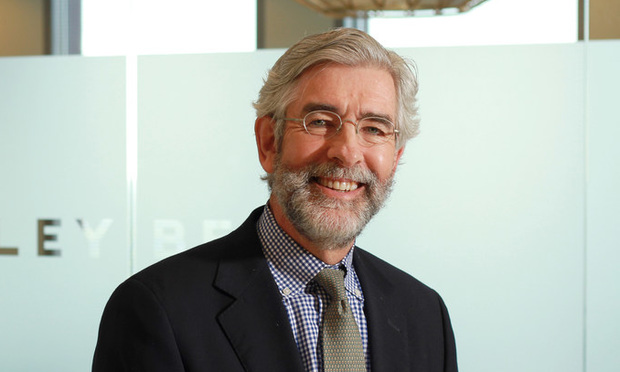Attorney of the Year Nominee: Edward Buckley
When Atlanta civil rights lawyer Edward Buckley filed a race discrimination lawsuit against Buford School Superintendent Geye Hamby last year, he embedded…
June 19, 2019 at 02:00 PM
6 minute read
 Edward Buckley, Buckley Beal, Atlanta. (Photo: John Disney/ALM)
Edward Buckley, Buckley Beal, Atlanta. (Photo: John Disney/ALM)
When Atlanta civil rights lawyer Edward Buckley filed a race discrimination lawsuit against Buford School Superintendent Geye Hamby last year, he embedded the complaint with recordings allegedly capturing Hamby using racial epithets.
Hamby—Buford's school superintendent since 2006—was suspended one day after those recordings became public. He resigned within days but made no mention of the epithet-laced recordings, which included an obscene threat to shoot a black worker.
Instead, in an Aug. 24 letter, Hamby offered "my sincere apologies for any actions that may have created adversity for this community and the Buford school district."
In February—two months after Buckley settled another race discrimination case against the Georgia Vocational Rehabilitation Agency for $1.5 million—newly elected Gov. Brian Kemp replaced agency director Sean Casey, who was named as a defendant in that case. Kemp "decided to move in a different direction," the governor's spokeswoman said of Casey's replacement.
Buckley—a founding partner of Buckley Beal—says he didn't set out to secure the resignations of Hamby or Casey, although he calls his tactic of embedding links to recordings like the one attributed to Hamby, "an effective way to get the court's attention. It causes these kinds of important events to become part of the pleadings in the case."
"One of the things we try to do when we see things like that is to help government be better, to point out to government where it's making egregious mistakes and why it needs to improve," he said. "If that involves a change of personnel, that decision is uniquely up to government."
"While Mr. Hamby did resign and did seem to apologize for his actions … I didn't think he could have effectively remained in that position after the audiotape was released," Buckley said.
Buckley said he doesn't know what prompted Casey's departure. But, he added, "I don't think the optics were especially good for Mr. Casey remaining in his position."
Buckley filed the suit against Hamby and the principal of public elementary school Buford Academy last year in the U.S. District Court for the Northern District of Georgia in Atlanta on behalf of plaintiff Mary Ingram. It remains in litigation.
Ingram, an African American paraprofessional for nearly 20 years at Buford Academy, sued after Hamby targeted her for termination because she spoke up at a local school board meeting. Ingram chided the board about the school district's failure to live up to a promise made years earlier when the county's black and white high schools merged, according to the suit. That promise was to make sure that the mascot colors of both schools were incorporated into the new, racially integrated school.
Hamby "actually drafted the letter of termination," Buckley said. The superintendent also repeatedly demanded that school administrators "write her [Ingram] up" for minor infractions after her school board appearance to lay the groundwork for her termination.
But Ingram "has always had the courage of her convictions," Buckley said. "If you disagree with the government, you should petition the government. That's what she did."
Before the Vocational Rehabilitation Agency and Casey settled in December, Buckley secured emails under the state open records law showing that, within weeks of Casey's 2016 appointment, his wife—the associate general counsel for the state's largest alcoholic beverage wholesaler—shared fill-in-the-blank scripts with him via email on how to fire the agency's three top African American administrators.
Buckley said that emails from Tiffani Casey's corporate account to her husband in December 2016 bolstered the lawsuit's contention that "there was a decision to terminate" Audrey Fuller, the agency's former assistant director of training centers; Robert Nibbs, the agency's former chief business development officer; and Jimmy Wilson, its former chief financial and chief operating officer "before the alleged reasons for termination had been arrived at."
State Attorney General Chris Carr and staff lawyers negotiated the settlement agreement while the case was still in discovery. Sean Casey denied the claims.
Buckley said attorneys need to get over "certain mythologies" that cases carry little value unless significant amounts of back pay are involved.
"If the conduct is egregious, there should be an appropriate award," he said. "Often when people are fired, their reputations take a hit. Your reputation is sometimes all you have. That's certainly true for our clients. When they are suddenly put in a position where they have to defend themselves for something they didn't do, it's a terrible quandary and creates all kinds of anguish."
"What lawyers who work in this area should recognize is there is no formula for these cases," he said. "It really depends on the specific facts, the specific circumstances of a case. Where conduct is especially egregious, it merits an appropriate award."
Buckley also said juries have become more discerning. "What they look at now, more than ever, are procedural improprieties in an individual's termination," he said. "A lot of folks on a jury now are mid-level managers who understand you have to follow procedures, that those procedures are there to protect people from being wrongly fired. … They get it." he said.
In 2018, Buckley also continued his commitment to installing potable water systems in Caribbean villages through Water Life Hope, a nonprofit he founded that partners with Food for the Poor. Buckley said Water Life Hope is currently finishing a project in Jamaica that will provide potable water for eight of the island nation's medical clinics. He said he is also raising money for a new project to install a potable water system in central Haiti.
Buckley said that, when he founded Water Life Hope 14 years ago, "My wife said it was my midlife crisis. I just felt there was something I needed to do besides practice law in order to give back."
Water Life Hope has helped to build more than 300 potable water systems that now provide clean drinking water to more than 500,000 people.
Last year, Buckley also self-published a novel—"All the Way Home"—about two boys much like himself and his brother, who came of age during the rise of the civil rights movement in the South and whose father was a lawyer who promoted civil rights when it was often dangerous to do so.
"I call it Southern-fried Gothic," Buckley said. It has a little bit of magic, a little bit of baseball and, of course, a civil rights jury trial. The 440-page book has gotten five-star reviews on Amazon.
Said Buckley: "I just had a story," although one he said turned out quite differently than when he started writing it.
"Every day, I am dealing with fact, fact, fact," he said. "This time, I could just make stuff up. It was a little bit of the world as I wish it would be."
This content has been archived. It is available through our partners, LexisNexis® and Bloomberg Law.
To view this content, please continue to their sites.
Not a Lexis Subscriber?
Subscribe Now
Not a Bloomberg Law Subscriber?
Subscribe Now
NOT FOR REPRINT
© 2025 ALM Global, LLC, All Rights Reserved. Request academic re-use from www.copyright.com. All other uses, submit a request to [email protected]. For more information visit Asset & Logo Licensing.
You Might Like
View All
On The Move: Energy Infrastructure Pro Joins Moore & Van Allen, Adams & Reese Changes Atlanta Leadership
6 minute read
40% Contingency: A New Ruling Just Cost This Plaintiff Team $827K in Legal Fees
6 minute read

'David and Goliath' Dispute Between Software Developers Ends in $24M Settlement
Trending Stories
- 1'It's Not Going to Be Pretty': PayPal, Capital One Face Novel Class Actions Over 'Poaching' Commissions Owed Influencers
- 211th Circuit Rejects Trump's Emergency Request as DOJ Prepares to Release Special Counsel's Final Report
- 3Supreme Court Takes Up Challenge to ACA Task Force
- 4'Tragedy of Unspeakable Proportions:' Could Edison, DWP, Face Lawsuits Over LA Wildfires?
- 5Meta Pulls Plug on DEI Programs
Who Got The Work
Michael G. Bongiorno, Andrew Scott Dulberg and Elizabeth E. Driscoll from Wilmer Cutler Pickering Hale and Dorr have stepped in to represent Symbotic Inc., an A.I.-enabled technology platform that focuses on increasing supply chain efficiency, and other defendants in a pending shareholder derivative lawsuit. The case, filed Oct. 2 in Massachusetts District Court by the Brown Law Firm on behalf of Stephen Austen, accuses certain officers and directors of misleading investors in regard to Symbotic's potential for margin growth by failing to disclose that the company was not equipped to timely deploy its systems or manage expenses through project delays. The case, assigned to U.S. District Judge Nathaniel M. Gorton, is 1:24-cv-12522, Austen v. Cohen et al.
Who Got The Work
Edmund Polubinski and Marie Killmond of Davis Polk & Wardwell have entered appearances for data platform software development company MongoDB and other defendants in a pending shareholder derivative lawsuit. The action, filed Oct. 7 in New York Southern District Court by the Brown Law Firm, accuses the company's directors and/or officers of falsely expressing confidence in the company’s restructuring of its sales incentive plan and downplaying the severity of decreases in its upfront commitments. The case is 1:24-cv-07594, Roy v. Ittycheria et al.
Who Got The Work
Amy O. Bruchs and Kurt F. Ellison of Michael Best & Friedrich have entered appearances for Epic Systems Corp. in a pending employment discrimination lawsuit. The suit was filed Sept. 7 in Wisconsin Western District Court by Levine Eisberner LLC and Siri & Glimstad on behalf of a project manager who claims that he was wrongfully terminated after applying for a religious exemption to the defendant's COVID-19 vaccine mandate. The case, assigned to U.S. Magistrate Judge Anita Marie Boor, is 3:24-cv-00630, Secker, Nathan v. Epic Systems Corporation.
Who Got The Work
David X. Sullivan, Thomas J. Finn and Gregory A. Hall from McCarter & English have entered appearances for Sunrun Installation Services in a pending civil rights lawsuit. The complaint was filed Sept. 4 in Connecticut District Court by attorney Robert M. Berke on behalf of former employee George Edward Steins, who was arrested and charged with employing an unregistered home improvement salesperson. The complaint alleges that had Sunrun informed the Connecticut Department of Consumer Protection that the plaintiff's employment had ended in 2017 and that he no longer held Sunrun's home improvement contractor license, he would not have been hit with charges, which were dismissed in May 2024. The case, assigned to U.S. District Judge Jeffrey A. Meyer, is 3:24-cv-01423, Steins v. Sunrun, Inc. et al.
Who Got The Work
Greenberg Traurig shareholder Joshua L. Raskin has entered an appearance for boohoo.com UK Ltd. in a pending patent infringement lawsuit. The suit, filed Sept. 3 in Texas Eastern District Court by Rozier Hardt McDonough on behalf of Alto Dynamics, asserts five patents related to an online shopping platform. The case, assigned to U.S. District Judge Rodney Gilstrap, is 2:24-cv-00719, Alto Dynamics, LLC v. boohoo.com UK Limited.
Featured Firms
Law Offices of Gary Martin Hays & Associates, P.C.
(470) 294-1674
Law Offices of Mark E. Salomone
(857) 444-6468
Smith & Hassler
(713) 739-1250






